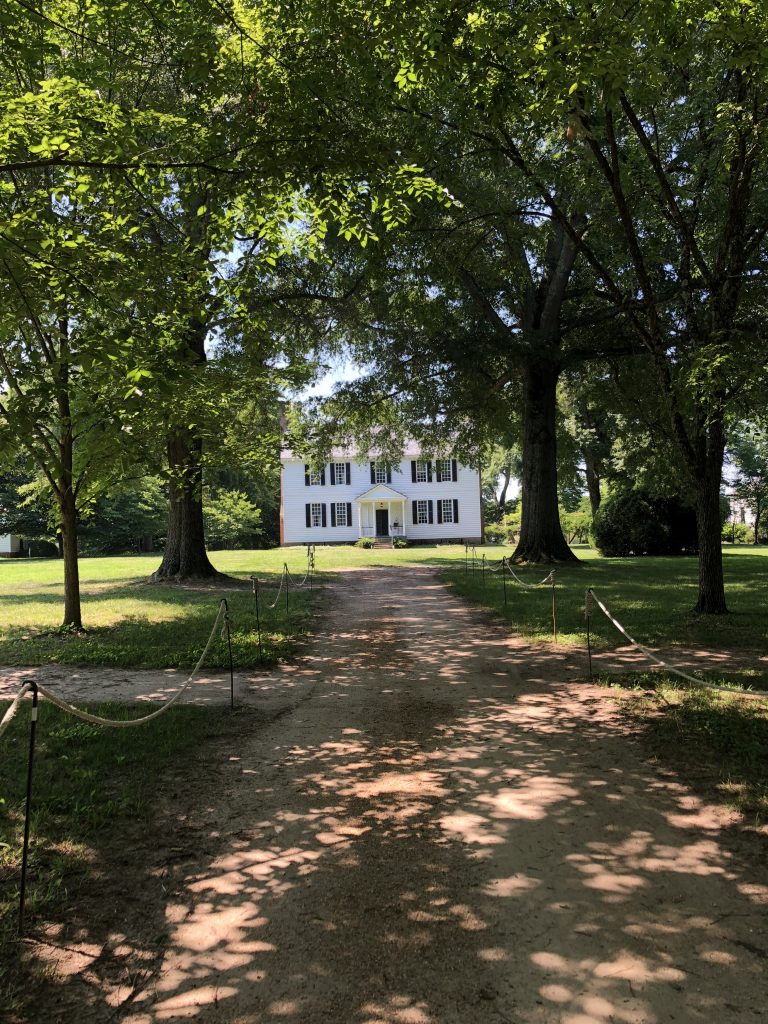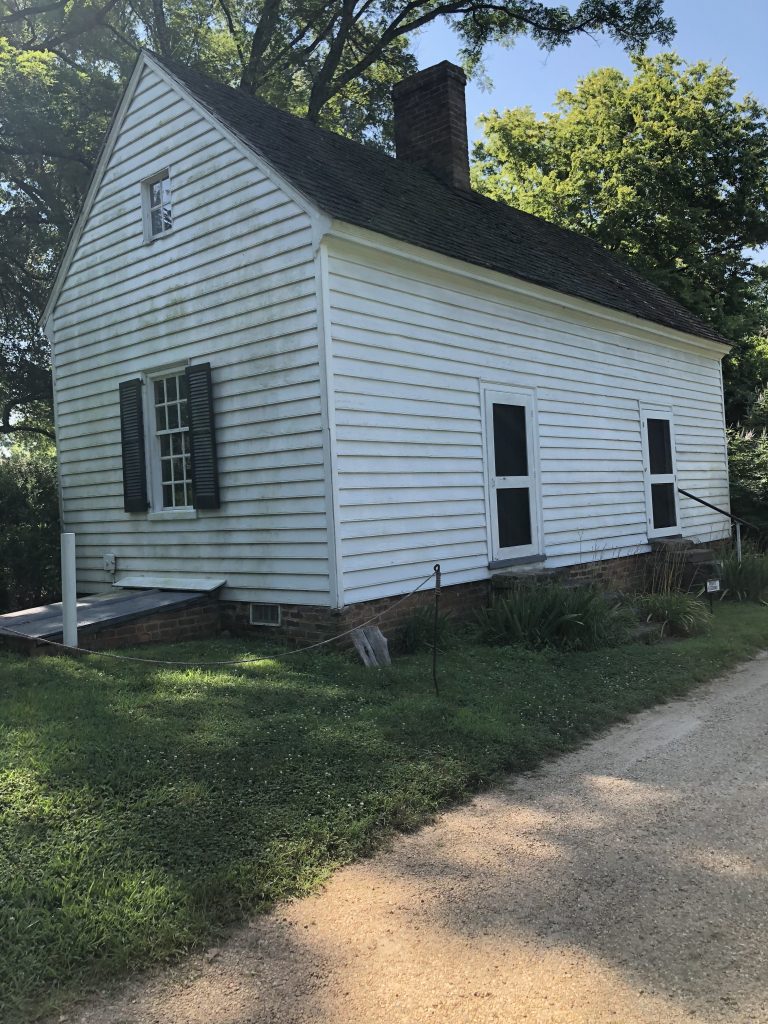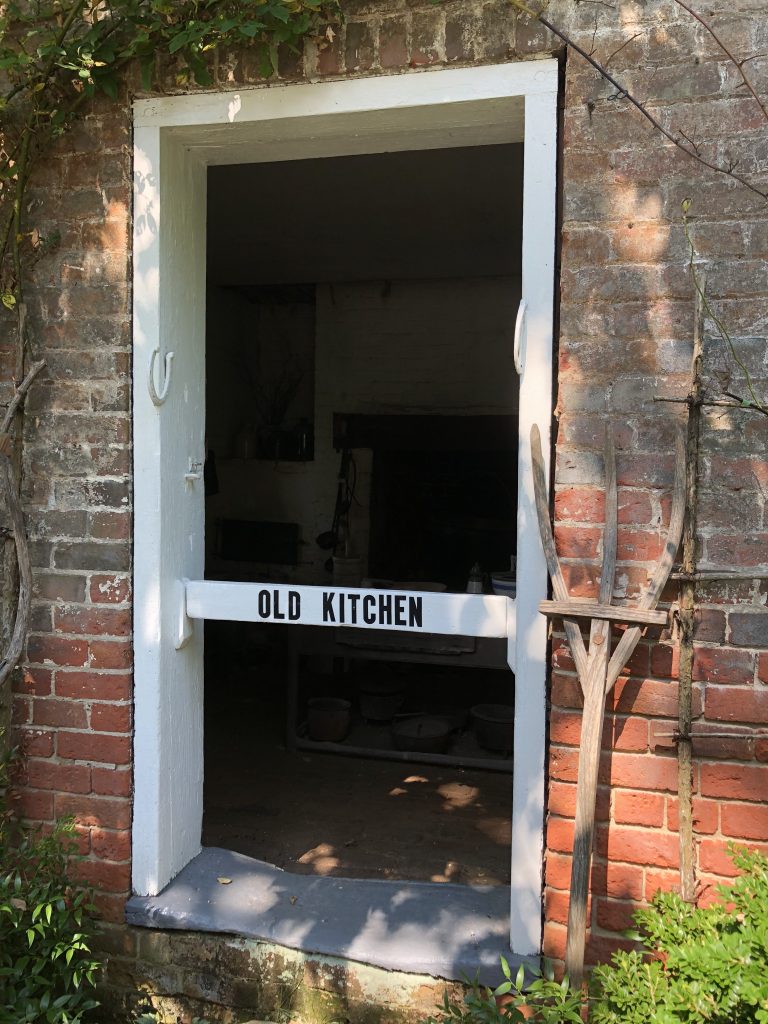by Tucker Shelley
Tucker Shelley is a rising senior at UR from Burlington, Vermont. He is a member of the Theta Chi fraternity on campus. In his free time, Tucker prefers staying active and listening to good music. This is his first summer working on the Race & Racism Project and will continue similar work next semester for Dr. Maurantonio in the “Digital Memory and the Archive” course.
 In early July, I took a trip to the Tuckahoe Plantation in Richmond, Virginia. A quick drive from the University of Richmond, the plantation is just down River Road, strategically placed near the banks of the James River. The house was originally built by the Randolphs, a wealthy, large family that was widely respected throughout Virginia in the 1700s. Coming into the tour, I was under the impression that this was a plantation owned by Thomas Jefferson and his family. I have often heard it referred to as the Jefferson plantation and on the website they advertise it as “the boyhood home of Thomas Jefferson.” It came as quite a surprise to me that his family only moved into the house to raise the kids of Thomas Randolph after his and his spouse’s early deaths, as Thomas Randolph and Peter Jefferson, Thomas’ Father, had agreed upon earlier. The tour focused a decent amount on Thomas Jefferson, as that is what gets people to continue visiting.
In early July, I took a trip to the Tuckahoe Plantation in Richmond, Virginia. A quick drive from the University of Richmond, the plantation is just down River Road, strategically placed near the banks of the James River. The house was originally built by the Randolphs, a wealthy, large family that was widely respected throughout Virginia in the 1700s. Coming into the tour, I was under the impression that this was a plantation owned by Thomas Jefferson and his family. I have often heard it referred to as the Jefferson plantation and on the website they advertise it as “the boyhood home of Thomas Jefferson.” It came as quite a surprise to me that his family only moved into the house to raise the kids of Thomas Randolph after his and his spouse’s early deaths, as Thomas Randolph and Peter Jefferson, Thomas’ Father, had agreed upon earlier. The tour focused a decent amount on Thomas Jefferson, as that is what gets people to continue visiting.

The tour is done thematically, starting with a tour of the grounds, followed by a tour of the house. During this tour of the grounds is the only time that slavery is mentioned. As we walked past the slave quarters, it was pretty hard to disregard them. However, this tour certainly was not about the enslaved black people of Tuckahoe Plantation. While I was hoping for some more information on those enslaved and their living conditions, it makes sense for them to focus their attention elsewhere. I certainly don’t blame the proprietors of the plantation, as most people in Virginia that visit the plantation don’t have a similar background to mine. The fact that they even mentioned that the Randolphs were enslavers is a step in the right direction from other similar plantations (for example, see Rena Xiao’s post on her visit to Westover Plantation). I didn’t expect them to even mention those enslaved. However, the guide brought them up only when he explained that the current owners of Tuckahoe had made the old slave quarters into “modern, livable huts” for visitors to stay in. He used this as a transition into how the Randolph’s were the epitome of southern hospitality. They would have visitors in and out of the house almost all the time. The tour guide said the Thomas’ (current owners) like to keep that tradition going by opening the house to the public for tours, marriages, and other big events.
 This makes me think of what “southern hospitality” really means. Obviously, on the surface, it means letting anyone into your home and treating them like family. But what does “everyone” mean? To me, it seems like southern hospitality applies to everyone–as long as you’re white. However, on the other hand, I don’t think any black person would be itching to have their weddings at a plantation. Having your wedding at a space that either was or was similar to somewhere their ancestors were forcibly enslaved wouldn’t be a first choice. It’s a constant reminder of history perpetuating itself through exclusion. While these places pride themselves on inclusion and hospitality, the space could not be less inviting to black people. This applies to this plantation, but also white spaces like this (Monument Avenue, for example) in cities all over the country and especially in the south where they pride themselves on openness. I do not foresee anything happening to change this other than time, acceptance, and dialogue.
This makes me think of what “southern hospitality” really means. Obviously, on the surface, it means letting anyone into your home and treating them like family. But what does “everyone” mean? To me, it seems like southern hospitality applies to everyone–as long as you’re white. However, on the other hand, I don’t think any black person would be itching to have their weddings at a plantation. Having your wedding at a space that either was or was similar to somewhere their ancestors were forcibly enslaved wouldn’t be a first choice. It’s a constant reminder of history perpetuating itself through exclusion. While these places pride themselves on inclusion and hospitality, the space could not be less inviting to black people. This applies to this plantation, but also white spaces like this (Monument Avenue, for example) in cities all over the country and especially in the south where they pride themselves on openness. I do not foresee anything happening to change this other than time, acceptance, and dialogue.
